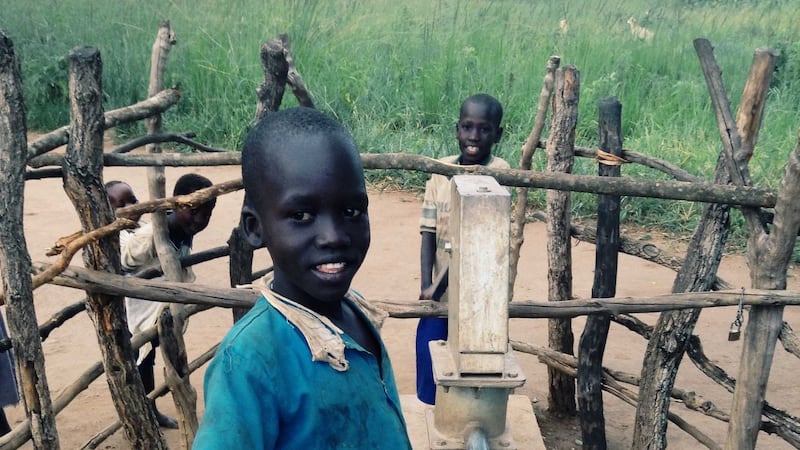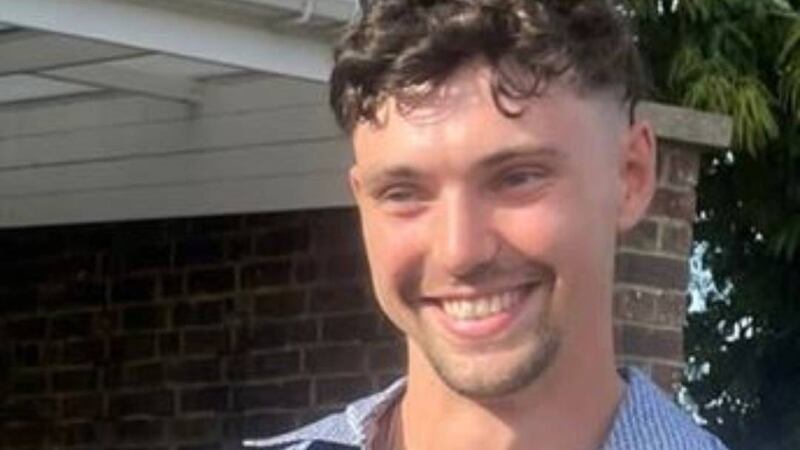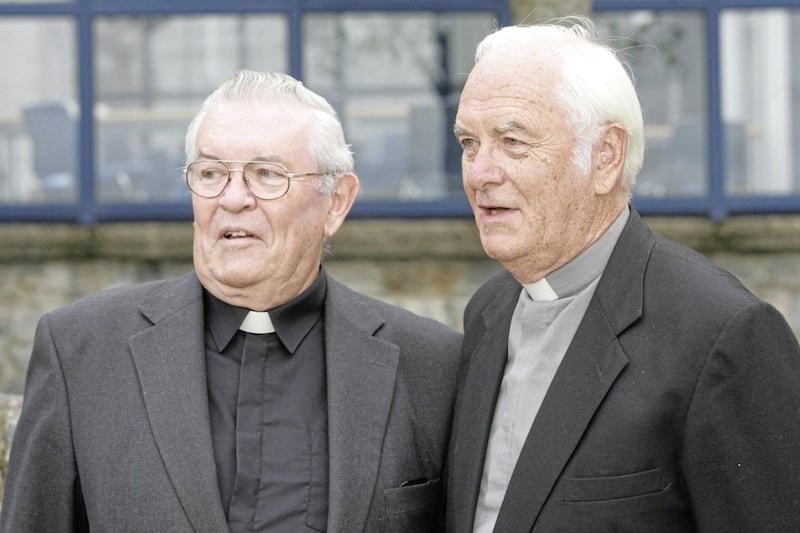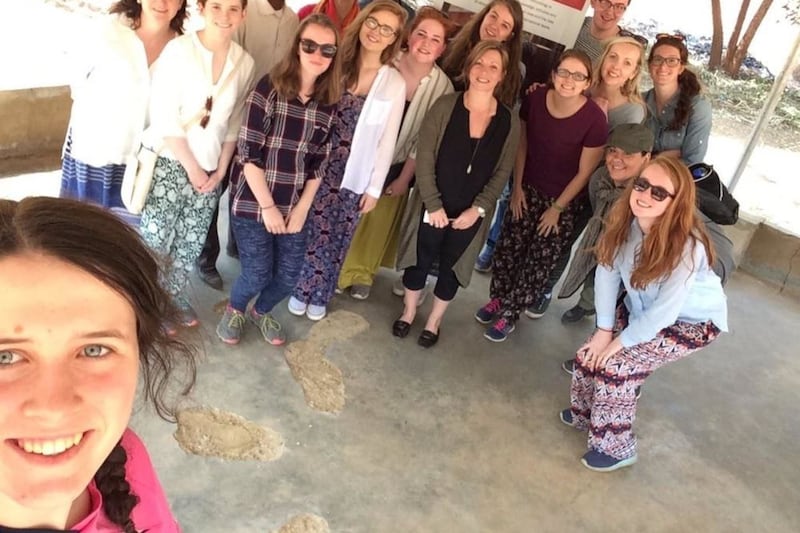SOME 38 million people worldwide have fled their homes and been forced to survive elsewhere within their own country to escape armed conflict and violence. Living in constant fear, all that they own has been destroyed or left behind – and it’s impossible for them to earn a living or access essential services.
In the second of two reports, Concern Worldwide’s Darren Vaughan travelled to northern Uganda to meet some of the nearly two million people who were internally displaced after decades of violence by the Lord’s Resistance Army - and who are now rebuilding their lives with the support of people from Northern Ireland.
She sits on the exposed roots of the village mango tree and feeds her three-month-old daughter. Margaret Ayaa never thought she would see this day. The 49 year old is glad to be alive, comforted from nursing her youngest, Florina, in her arms, and relieved that the nightmare of decades of fear and violence is over. But she will never forget.
In 2002, Margaret, her husband and three children did not want to leave their village of Acano East in Pader, Uganda. However, when Lord’s Resistance Army (LRA) rebels moved closer to their community, they could stay no longer.
“Every day you would hear that somebody was killed,” said Margaret.
“After a while, I began to think that everyone in the whole country would be gone. Sometimes, I would spend two days in the bush without eating - hiding for dear life.”
For more than 20 years, the people of northern Uganda were terrorised by one of Africa’s most brutal militia groups. The LRA, led by Joseph Kony, became notorious for its campaign of murder and abduction - taking captive tens of thousands of young men, women and children to serve as sex slaves and fighters.
At the height of the conflict, 1.84 million people were displaced. Abandoning their homes and villages, they were moved into 251 government camps or ‘protected villages’ across the region. It was to one of these camps that Margaret and her family eventually fled. But their torment did not end there.
“We had no means to generate an income because we didn’t have land on which to grow food. Every day was just about survival, about getting by,” she said.
“Sometimes, we would sell water and if we earned $0.15 a day we would buy what little we could for the family. As a mother, I would do without for a day because I would first feed my children. I would sit and watch them eat. It was obvious to me that if I ate also, the children would not be satisfied, they would not have enough.”
With the LRA’s departure, Margaret and her family decided it was safe to go back home in 2008, joining tens of thousands of Ugandans in the difficult process of resettlement. Many of them returned to nothing –their villages were all but wiped out, the surrounding farmland was wild and uncultivated, their livestock long gone.
One major problem for Margaret and her community arriving back at Acano East was lack of clean water. Their only access to drinking water was from the nearby River Agogo, which meant the level of sickness among villagers was high.
With basic services for returnees inadequate and support to rebuild their livelihoods limited, international development organisation Concern Worldwide stepped in to help.
The first move was to rehabilitate a disused borehole in the village to provide a constant supply of safe drinking water. After that, they promoted good sanitation and hygiene practices and every household was encouraged to build its own latrine. Bit by bit, the well-being of the community improved and the lives of villagers were transformed.
It’s something Concern’s plans to repeat across two districts in northern Uganda, setting up 60 water points by drilling new boreholes or rehabilitating old ones to serve 20,000 previously displaced people. The result will be fewer water-related illnesses such as typhoid and diarrhoea, and healthier communities.
For Margaret and the rest of her village, the benefits are immeasurable.
“Now we’re free of those diseases and that enables us to dig, work and earn. I’m very thankful and appreciate Concern’s help,” said Margaret.
“I’m very proud because we never had anything like clean water before. We are at home now, we are free. I’m happy because I feel like at chief in my own house.”
Giving survivors of conflict the support they need to flourish
47-year-old Nasa Oyoo Otii is a man who was once captivated by a dream. When Lord’s Resistance Army rebels discovered him hiding in the bush and threatened to kill him, he thought his life was over. However, he managed to escape to a displacement camp nearly 150 miles from his home in Bolimoor, Pader.
Conditions at the camp were squalid –violence and disease were rife, food was scarce and people had no way to make a living. But in all his ten years there, Nasa never lost hope of returning home again. He used to dream about one day rebuilding his house for his wife and six children.
“When I could afford it, I would buy a sheet of corrugated zinc,” recalled Nasa.
“And when the situation calmed down, I came back with the money I had saved and the sheets of zinc in order to rebuild my life. I used to dream that God would give me the strength to construct my own house. And that’s what I did.”
When he eventually returned to his village in 2010, Concern Worldwide helped Nasa get back on his feet again. Many returnees were struggling with a lack of resources - their hoes and machetes had been stolen, their goats and sheep had long since disappeared. The land had lain fallow for years and they had neglected their skills. As part of a livelihoods recovery programme, Concern and a local community group gave Nasa and other farmers in the district the seeds, tools and knowledge they needed to start cultivating the land again.
Nasa and his 41-year-old wife, Margaret, began to grow peas, ground nuts, cassava, maize and sesame.
Margaret said: “Coming home again felt like a huge release, freedom from the pain we had suffered. It meant we could take control of our lives again. We could dig in the fields once more.
“Before we had help from Concern, life was difficult. We had no seeds and stems to plant. Now our harvests are good –the ground nut yield is high and the cassava is almost ready.”
The family’s crops have been so successful that they have been able to buy a plot of land on which to build a small grocery shop. They have also purchased a pair of oxen and a portable grinding mill, and started a clothes mending business with an old sewing machine.
“All that you see today has come from the help I received,”said Nasa.
“I would never have dreamed that I’d be where I am today. Now I feel I can do anything.”
Helping families come back from crisis
Armed conflict, disease, floods and earthquakes devastate the lives of millions of people each year. In fact, the number of people affected by humanitarian emergencies has almost doubled in the past decade and is expected to keep rising.
Often, it’s the poorest and most vulnerable who are hardest hit – loved ones are lost, homes and belongings are destroyed, and livelihoods are wrecked. When the immediate crisis is over, survivors face the enormous challenge of rebuilding their lives.
Concern Worldwide works with some of the world’s poorest communities in places often at greatest risk from disasters, both natural and manmade. They act quickly in emergencies to save lives, and then stay to help people recover. Right now, it is responding to 33 emergencies in 23 countries, directly supporting 2.8 million people.
This autumn, Irish News readers can help families like Margaret and Nasa’s rebuild their lives by supporting Concern’s Comeback from Crisis appeal.
Donations made before 13 December will be matched pound for pound by the UK government to help more of the world’s poorest communities recover from emergencies and cope in the future.
For more information visit www.concern.net/recover
To donate £5, text COMEBACK to 70099








